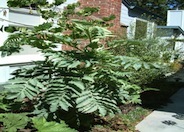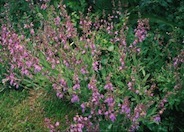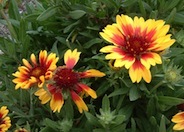
Common name:Honey Bush
Botanical name:Melianthus major
Melianthus major is an evergreen shrub. Soft-wooded plant of rapid growth to 12-14 ft. Boldly patterned foliage. Grayish green leaves of 1 ft. long, divided into 9-11 strongly toothed leaflets. Foliage smells disagreeable when brushed or bruised. Foot-long spikes of reddish brown, 1 in. flowers in late winter, early spring.

Common name:Pride Of Madeira
Botanical name:Echium candicans
Mature specimens of this evergren shrub can grow to a size of 6'-8' tall and 8'-10' wide. In the spring, spikes of rosy-violet to blue-purple flowers appear. It should receive sun to part shade, with little or no summer watering when established. This plant can be severely damaged by frost below 25 degrees F. -Monterey Bay Nursery

Common name:Perennial Marigold, Copper Canyon D
Botanical name:Tagetes lemmonii
This larger perennial will grow to 6' tall and has small, light green leaves with yellow-mustard colored flowers that bloom in winter and spring. Cut-back to within 6" of the ground to refresh and reduce the size of the plant in summer. A riot of color.

Common name:Garden or Common Sage
Botanical name:Salvia officinalis
This shrubby perennial will grow 1-3' tall and 1-2.5' wide. It has gray green leaves that are white and hairy underneath and clusters of blue/purple flowers that bloom in late spring and summer.

Common name:Blanketflower
Botanical name:Gaillardia X grandiflora
Daisylike flowers in warm colors on sturdy stems. Plants form medium-sized clumps. Like full sun, well-drained soil. Tolerates poor soil and drought. Great cut flower.
The natural world works in cycles. Everything is changing form and moving from place to place in an endless energy exchange system. The leaves and twigs that fall to the ground, not to mention other life forms that might die, decompose and combine with water, air and minerals of the soil to create a medium for future plants.
Click in the green box for more information
Designer: Sarah Nichols
Photographer: GardenSoft
Incorporate compost 6" into your soil to retain water, reduce compaction, feed earthworms, and provide valuable nutrients to your plants.
Drip and other smart irrigation delivers water directly to roots, allowing no excess water for weeds.